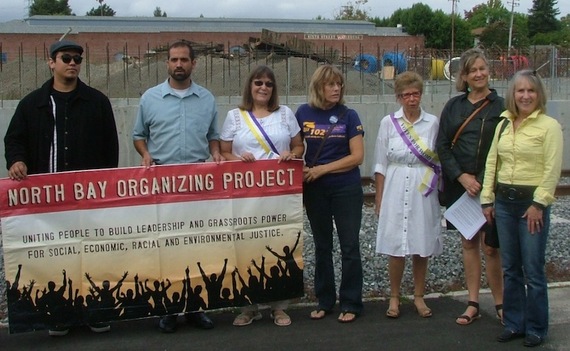In California, leaders of North Bay Organizing Project honored the 49th anniversary of regulations governing hiring on federal construction and other contracts by calling for changes that would help put America back to work and make sure employment of people of color more closely tracks with their participation in the work force. That could help address the problems at the root of the strife in Ferguson.
Sept. 24 was the 49th anniversary of an important federal policy ensuring access to taxpayer-funded work for all Americans. Faith leaders in Gamaliel and our campaign arm, Transportation Equity Network, are holding actions to highlight the fact that, if we want to have something to celebrate when the policy turns 50 next year, the Obama administration has some serious catching up to do.
Most people know affirmative action as a courtroom debate, but a similar policy began with a presidential order by President Lyndon Johnson Sept. 24, 1965. He ordered the Department of Labor to regulate the minority and female hiring of companies with federal construction contracts. LBJ opened the door to good-paying construction jobs for low-income people. Unfortunately, this giant step forward has not been supported by more recent presidents. The regulations were last updated in 1980 by President Jimmy Carter.
"These numbers are out of date by more than three decades," says Irma Wallace, who is national co-chair of the Gamaliel jobs campaign and a leader with Faith Coalition for the Common Good in Springfield, Illinois. "At the same time, our communities have changed: More women are in the workforce, especially in construction careers, and the minority population has increased."
In Chicago, for example, where people of color made up 19.6 percent of the workforce in 1980, now they make up 30.75 percent (based on 2010 American Community Survey population estimates). In Milwaukee, people of color were 8 percent of the workforce in 1980, but 20.91 percent now. Changes in some communities have been less dramatic -- St. Louis went from 14.7 percent to 20.7 percent, for example. But in Springfield, Illinois, the share of people of color in the workforce tripled, from 4.5 percent of the workforce to 13.6 percent.
Gamaliel and TEN wrote a briefing paper on this; it is available here.
The need for these jobs is huge, in the nation and in Ferguson, Missouri, a center of racial unrest since the shooting of Michael Brown. One of the best responses to the riots has been by the Centene Corporation, which is adding a location in Ferguson that will employ 200 people. President Obama can do the same and open thousands of employment opportunities to low-income people, minorities and women, if he makes the update these important regulations a priority.
Here's why the update is needed:
- Women make up only 2.6 percent of construction workers.
- African Americans continue to be unemployed at a rate 2.2 times that of their white counterparts.
- In 2013 the average U.S. unemployment rate was 6.7 percent, the unemployment rate for white Americans was 5.9 percent, and the unemployment rate for African Americans was 11.9 percent.
Groups that will be taking action on this issue in the next few weeks include Faith Coalition for the Common Good; Gamaliel of Metro Chicago; MICAH in Milwaukee, Wisconsin; MORE2 in Kansas City, Kansas and Missouri; North Bay Organizing Project in Sonoma County, California; and United Congregations of Metro East in East St. Louis, Illinois.
Mr. President, let's work together to put America back to work.
